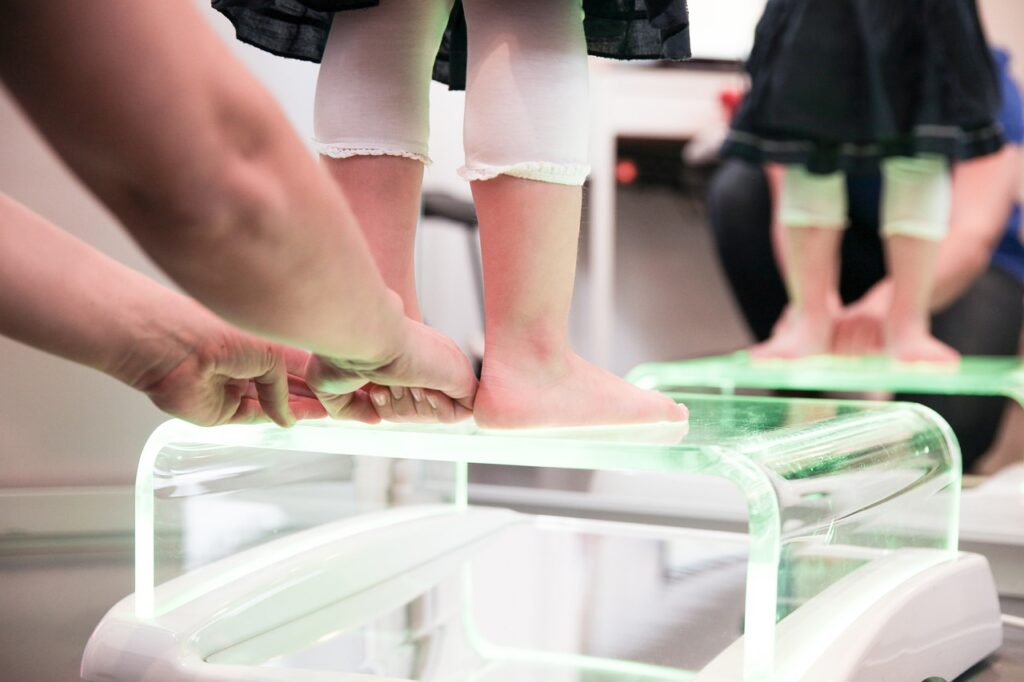Can orthotics cause knee pain? Well, we’re here to shed some light on this topic.
Orthotics, those nifty little devices that go inside your shoes, are designed to address foot problems and improve foot health. However, if not properly fitted, they can actually contribute to knee pain.
The way they change your weight distribution and foot mechanics can affect your posture and put unnecessary strain on your knees. But fear not! By seeking advice from a Pedorthist and using custom orthotics tailored to your unique foot needs, you can prevent knee pain and improve your overall foot health.
So let’s dive in and learn more about the potential link between orthotics and knee pain, as well as the solutions to address this issue.
Key Takeaways
– Orthotics can cause knee pain if they change the alignment of the knee joint incorrectly.
– Ill-fitting orthotics or using the wrong type of orthotic can lead to knee pain.
– New knee pain when starting to wear orthotics may be due to the realignment process.
– Wearing orthotics as prescribed is important to avoid knee pain.

Understanding knee pain and orthotics
In managing knee pain, orthotics play a crucial role. Our knowledge on the subject suggests that properly fitted orthotics can provide cushioning and support to the feet, thus relieving stress and strain on the foot and ultimately reducing knee pain.
Evidence also points to the fact that orthotics can help maintain good posture and prevent injury, making them an important tool in the management of knee pain.
Role of orthotics in managing knee pain
To manage your knee pain, orthotics can play a crucial role in supporting and aligning your feet, preventing excessive strain on your knees. Orthotics help relieve knee pain by providing cushioning and support to the feet, reducing stress and strain on the foot.
Custom orthotics are especially effective in addressing individual foot needs and improving overall body alignment. By wearing properly fitted orthotics, you can reduce pain and discomfort associated with chronic knee pain.
Here are two emotional benefits of using orthotics to manage knee pain:
- Relief: Orthotics offer a sense of relief by reducing pain and discomfort in the knees, allowing you to engage in activities with more freedom and ease.
- Confidence: With orthotics, you can regain confidence in your ability to move without experiencing debilitating knee pain, leading to a greater sense of belonging and participation in everyday activities.
Investing in custom orthotics can significantly improve foot health and relieve knee pain, ensuring a more comfortable and active lifestyle.
Types of orthotics
Custom orthotics can be made from various materials and are designed to fit your feet. These orthotics are specifically crafted to provide support and comfort while addressing any foot issues that may cause knee pain.
The custom fit ensures that the orthotics align with the natural contours of your feet, promoting proper posture and reducing strain on the knee joint.
When wearing orthotics, it is important to give your body time to adjust, as the realignment process may initially cause some discomfort. However, if you experience persistent knee pain while wearing orthotics, it is crucial to consult with a healthcare professional to ensure proper fit and alignment.
Orthotics and joint issues
When experiencing joint issues, it is important to consider orthotics as a potential solution for support and relief. Orthotics can play a crucial role in addressing knee pain and other joint issues by improving foot biomechanics and alignment. Here are some key points to consider:
- Orthotics can help correct gait abnormalities and reduce strain on the joints, including the knees.
- Custom-made orthotics, prescribed by a podiatrist, are tailored to your specific needs and can provide optimal support.
- Chronic pain caused by misalignment can be alleviated with the use of orthotics.
- Orthotics can help distribute weight evenly across the foot, reducing pressure on the knees.
- Properly fitted orthotics can improve foot function and relieve pain associated with joint issues.
Potential link between orthotics and knee pain
If you’re experiencing discomfort in your knees while wearing orthotics, it’s important to consult a healthcare professional for evaluation and potential adjustments.
While orthotics are designed to alleviate foot pain and improve overall body alignment, they can occasionally cause knee pain if they are not properly fitted or if they change the alignment of the knee joint incorrectly. Ill-fitting orthotics or using the wrong type of orthotic can lead to stress and strain on the knees.
It’s crucial to ensure that your orthotics are custom-made to meet the unique structural needs of your feet. If you’re unsure whether your orthotics are causing your knee pain, consulting with a healthcare professional, such as a Pedorthist, can help identify the issue and provide solutions.
Common reasons orthotics may cause knee pain
When it comes to orthotics causing knee pain, there are several common reasons that should be considered.
One potential reason is the lack of proper acclimation to wearing orthotics. It takes time for the body to adjust to the changes in foot mechanics and weight distribution that orthotics provide.
Additionally, orthotics can aggravate pre-existing skeletal issues, such as arthritis or misalignments, which can put additional strain on the knees.
Lack of proper acclimation to wearing orthotics
Forgetting to ease into wearing orthotics can put tension on knee muscles and tendons, potentially causing knee pain. When we neglect the proper acclimation process, we risk harming our knees instead of finding relief.
It’s important to remember that wearing orthotics is a gradual journey towards better foot health and overall well-being. Here are a couple of emotional responses that may resonate with you:
- Frustration: We don’t want to experience more pain when trying to alleviate our knee discomfort. It can be disheartening to realize that our lack of patience and proper acclimation can potentially cause more harm.
- Hope: By choosing to follow the recommended acclimation process, we can give ourselves the best chance at finding relief from knee pain and improving our quality of life.
Aggravation of pre-existing skeletal issues
Aggravation of pre-existing skeletal issues is another potential cause of knee pain when wearing orthotics. If you already have foot problems such as plantar fasciitis or a misalignment in your feet, orthotics may exacerbate these issues and lead to increased strain on your knees.
The improper distribution of weight and altered foot mechanics caused by ill-fitting or inappropriate orthotics can put additional stress on your knees, resulting in pain and discomfort. It is important to consult with a professional Pedorthist who can properly assess your foot structure and design custom orthotics tailored to your specific needs.
Incompatibility between foot biomechanics and orthotics
If your foot biomechanics do not align properly with your orthotics, it can lead to discomfort and hinder the effectiveness of the support they provide. It is crucial to ensure that your orthotics are compatible with the needs of your feet to avoid any potential issues.
Incompatibility between foot biomechanics and orthotics can result in knee pain and pain in your feet. This can be emotionally distressing, as it can limit your mobility and affect your overall well-being. It is important to find the right orthotic that suits your foot biomechanics and provides the necessary support.
Wearing the wrong orthotic can exacerbate the problem and cause additional pain. To prevent this, consult with a professional to determine the right orthotic for your needs and ensure a proper fit in your shoe.
Solutions for addressing knee pain caused by orthotics
One solution for addressing knee pain caused by orthotics is to seek advice from a Pedorthist for personalized orthotic solutions.
When it comes to knee pain, it is crucial to find orthotics that address the specific needs of your feet and ankles. The Pedorthist will assess your foot biomechanics and make adjustments accordingly, ensuring that the orthotics provide the right support and alignment.
By wearing orthotics that are properly fitted and tailored to your individual needs, you can relieve chronic knee pain and reduce strain on the foot and ankle. These orthotics can distribute your body weight evenly, allowing for proper movement and healing.
Frequently Asked Questions
Can orthotics cause knee pain?
No, orthotics themselves do not cause knee pain. However, if not used correctly or if the wrong type of orthotic is used, it can potentially lead to knee pain.
What are orthotics?
Orthotics are devices that are inserted into shoes to provide support, correct alignment, and alleviate pain in the feet, ankles, knees, hips, and lower back.
How do orthotics help with knee pain?
Orthotics help with knee pain by improving the alignment of the feet and legs, which in turn reduces stress and pressure on the knee joints.
Are custom foot orthotics necessary for addressing knee pain?
Custom foot orthotics are not always necessary for addressing knee pain. In some cases, over-the-counter shoe inserts or insoles may be sufficient. However, custom orthotics that address the specific needs of the individual can provide more effective relief.
Can orthotics also help with hip and joint pain?
Yes, orthotics can also help with hip and joint pain. By improving alignment and reducing stress on the joints, orthotics can alleviate pain and discomfort in the hips and other joints.
How long does it take to feel the effects of orthotics?
The time it takes to feel the effects of orthotics can vary from person to person. Some individuals may start feeling better immediately, while others may take a few weeks to adjust and experience the full benefits.
Can orthotics correct a poor gait?
Yes, orthotics can help correct a poor gait. By providing proper alignment and support, orthotics can improve the way you walk and reduce the strain on your feet, legs, and knees.
Are soft orthotics less effective than rigid ones?
Soft orthotics and rigid orthotics serve different purposes and are designed for different foot conditions. While rigid orthotics offer more stability, soft orthotics provide cushioning and can be more comfortable for certain individuals. Both types can be effective in reducing knee pain, depending on the specific needs of the individual.
Do orthotics need to be custom made?
Orthotics do not always need to be custom made. Over-the-counter shoe inserts or insoles can provide sufficient support and relief for some individuals. However, custom-made orthotics are recommended for those with specific foot conditions or severe pain that cannot be adequately addressed by generic inserts.
Can orthotics be used for athletic activities?
Yes, orthotics can be used for athletic activities. They are designed to provide support and stability during physical activities, helping to prevent injuries and alleviate pain associated with high-impact movements.
Conclusion
In conclusion, orthotics can indeed cause knee pain if they are not properly fitted or designed to meet the unique needs of the feet. Just like a poorly constructed bridge can lead to structural issues, ill-fitting orthotics can disrupt weight distribution and foot mechanics, putting strain on the knees.
However, when custom orthotics are tailored to individual foot requirements, they can act as sturdy pillars, supporting foot health and preventing knee pain. It’s essential to seek guidance from a Pedorthist to find the right solutions and ensure a strong foundation for overall well-being.
